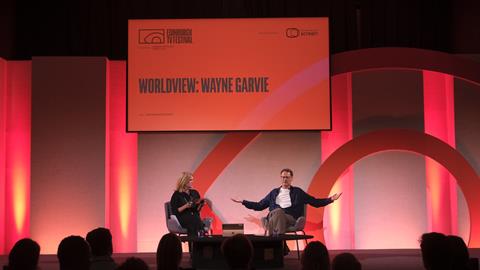Sony Pictures Television international production chief also talks up commissioning change

Producers must “pivot, change and adapt” to profit from the fast-growing creator economy before TV advertising money dries up, according to Sony Pictures Television’s (SPT) international production chief.
Wayne Garvie told a packed panel at the Edinburgh TV Festival the unscripted sector remained “challenged” and would not return to previous heights when cable ruled in the US.
“If you’re going to have longevity as an unscripted producer you have got to understand what your relationship is with brands,” he said, during his Worldview keynote.
“As a TV producer you now need to create for every platform. Very, very soon, that ad money is going to fall down, and it’ll be in going into that [creator] world. You have to pivot, change… and adapt.”
Garvie recently appointed former BBC Studios and 4Studio exec Matt Ford to lead its digital-first original content out of the UK, and the Sony exec was clear producers needed to lean into YouTube and social media.
During a wide-ranging discussion with Jane Tranter, chief exec at Sony-owned Bad Wolf, Garvie also discussed the growth of short-form, vertical microdramas: “There’s something to be learned from [then] in terms of how they make a production. I think we’re going to see the real impact of that in the next three years.”
MORE FROM EDINBURGH
Netflix eyes BBC again for unscripted role
Kevin Lygo: ‘every show that’s new is a risk’
Netflix triumphs at Edinburgh TV Awards
Gallery: Edinburgh International Television Festival, day three
But the exec questioned why young people would enter the TV production industry, when they could instead produce directly to audiences via services such as YouTube.
“When I look at young people working in what I will term quaintly as television, they are working in the creator economy,” he said.
“My daughter is 26 and has her own channel with 100,000 subscribers, she gets taken around the world on trips and lives an unbelievable life.
“There are hundreds of young people doing that, they talk directly to the audience, make the content on their phones and increasingly they find that that pays for itself.
“Why then would you want to work for an unscripted company to create a format that you have to sell to someone, who can sell it to someone else who might then commission it?”
Clamour for commissioning evolution
Garvie also reiterated comments made earlier this week by Banijay UK chief Patrick Holland that current commissioning processes are outdated and no longer work.
“We’ve got ourselves into a bit of a pickle where we have professional cadres of commissioners who aren’t empowered by the people who put them into their jobs.
“Consequently, to get an idea away, you need to speak to that person who needs to convince another person and then they all have a role in the production. And it goes on and on.
“Meanwhile, the fastest growing channel in the world is YouTube and guess what, it is self-commissioning. There might be a lesson in there,” he said, receiving a spontaneous round of applause from the audience.
Garvie, who oversees SPT’s production companies outside of the US – ranging from Curio Pictures in Australia and Teleset in Colombia to Left Bank Pictures in the UK – added he was seeing improvements in the travails of the scripted industry, with US buying picking up.
“I can see America easing up a bit,” he said, pointing to recent deals such as Australian drama Narrow Road into the Deep North’s sale to Prime Video.
During the entertaining hour-long discussion, Garvie also touched on AI and said the tech’s implications on the production sector have not yet been fully felt or understood.
“Over the next three years or so it will have quite a significant impact in terms of the ways we manage ourselves and our productions,” he added.
Tranter also suggested the industry feels like it remains in a “tight spot” with budgets squeezed, with Garvie responding by pointing to the relative nascency of the TV business as a whole.
“Television is a relatively young industry compared to others, such as the canned bean business,” he joked. “We need to view it as an industry that is changing in a world that is changing.”








No comments yet